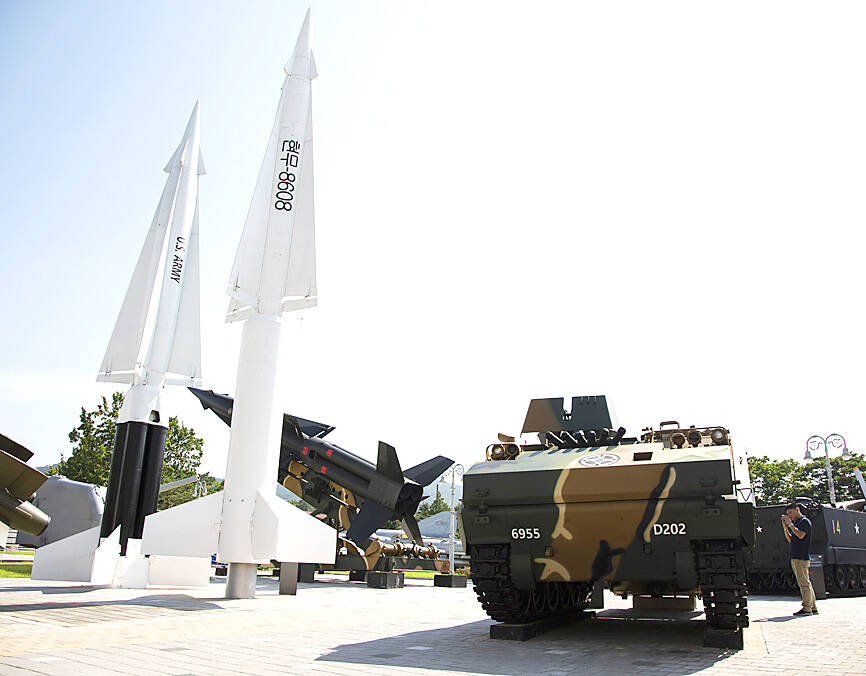North Korea yesterday fired several cruise missiles toward its western sea, South Korea’s military said, marking the second launch this week, apparently in protest against the docking of a nuclear-armed US submarine in South Korea.
While adding to its barrage of missile launches in the past few months, North Korea remained silent for a fifth day on the fate of a US soldier who bolted into the North across the Korean border this week.
The South Korean Joint Chiefs of Staff said the launches were detected from about 4am, but did not immediately report how many missiles were fired or how far they flew.

Photo: EPA-EFE
It said that the US and South Korean militaries were closely analyzing the launches.
North Korea in the past few years has been testing newly developed cruise missiles it describes as “strategic,” implying an intent to arm them with nuclear weapons.
Experts say the main mission of those weapons would include striking naval assets and ports. Designed to fly like small airplanes and travel along landscape that would make them harder to detect by radar, cruise missiles are among a growing collection of North Korean weapons aimed at overwhelming missile defenses in the South.
On Tuesday, US soldier Private Travis King sprinted across the border into North Korea while on a tour of an inter-Korean truce village.
North Korea’s state media has yet to comment on King and has not responded to US requests to clarify where he is being kept and what his condition is.
US officials have expressed concern about King’s well-being, considering North Korea’s previous rough treatment of some US detainees.
Some experts say the North might try to use King for propaganda or as a bargaining chip to coax political and security concessions from Washington, possibly tying his release with the US cutting back its military activities with South Korea.
Meanwhile, the G7, EU and three other countries are urging China to expel oil tankers from its waters that appear to be taking fuel to North Korea in defiance of UN sanctions, according to a letter seen by Agence France-Presse on Friday.
“We have concerns regarding the continuing presence of multiple oil tankers ... that use your territorial waters in Sansha Bay as refuge to facilitate their trade of sanctioned petroleum products to the DPRK,” the letter said, using initials for the North’s formal name, the Democratic People’s Republic of Korea.
Ambassadors from the G7 nations — Canada, France, Germany, Italy, Japan, the UK and the US — signed the letter. Also signing were envoys from the EU, South Korea, Australia and New Zealand.
In the letter, the ambassadors said they “would like to provide your government with additional information and satellite imagery that clearly indicates these practices continued to occur within China’s jurisdiction in 2022 and have continued in 2023.”
“We reiterate our previous request that China inspect the vessels for evidence of illicit oil smuggling, deny them all services, and ultimately expel them from your waters as quickly as possible,” it added.
Additional reporting by AFP

ENDEAVOR MANTA: The ship is programmed to automatically return to its designated home port and would self-destruct if seized by another party The Endeavor Manta, Taiwan’s first military-specification uncrewed surface vehicle (USV) tailor-made to operate in the Taiwan Strait in a bid to bolster the nation’s asymmetric combat capabilities made its first appearance at Kaohsiung’s Singda Harbor yesterday. Taking inspiration from Ukraine’s navy, which is using USVs to force Russia’s Black Sea fleet to take shelter within its own ports, CSBC Taiwan (台灣國際造船) established a research and development unit on USVs last year, CSBC chairman Huang Cheng-hung (黃正弘) said. With the exception of the satellite guidance system and the outboard motors — which were purchased from foreign companies that were not affiliated with Chinese-funded

PERMIT REVOKED: The influencer at a news conference said the National Immigration Agency was infringing on human rights and persecuting Chinese spouses Chinese influencer “Yaya in Taiwan” (亞亞在台灣) yesterday evening voluntarily left Taiwan, despite saying yesterday morning that she had “no intention” of leaving after her residence permit was revoked over her comments on Taiwan being “unified” with China by military force. The Ministry of the Interior yesterday had said that it could forcibly deport the influencer at midnight, but was considering taking a more flexible approach and beginning procedures this morning. The influencer, whose given name is Liu Zhenya (劉振亞), departed on a 8:45pm flight from Taipei International Airport (Songshan airport) to Fuzhou, China. Liu held a news conference at the airport at 7pm,

Taiwan was ranked the fourth-safest country in the world with a score of 82.9, trailing only Andorra, the United Arab Emirates and Qatar in Numbeo’s Safety Index by Country report. Taiwan’s score improved by 0.1 points compared with last year’s mid-year report, which had Taiwan fourth with a score of 82.8. However, both scores were lower than in last year’s first review, when Taiwan scored 83.3, and are a long way from when Taiwan was named the second-safest country in the world in 2021, scoring 84.8. Taiwan ranked higher than Singapore in ninth with a score of 77.4 and Japan in 10th with

Authorities yesterday elaborated on the rules governing Employment Gold Cards after a US cardholder was barred from entering Taiwan for six years after working without a permit during a 2023 visit. American YouTuber LeLe Farley was barred after already being approved for an Employment Gold Card, he said in a video published on his channel on Saturday. Farley, who has more than 420,000 subscribers on his YouTube channel, was approved for his Gold Card last month, but was told at a check-in counter at the Los Angeles International Airport that he could not enter Taiwan. That was because he previously participated in two